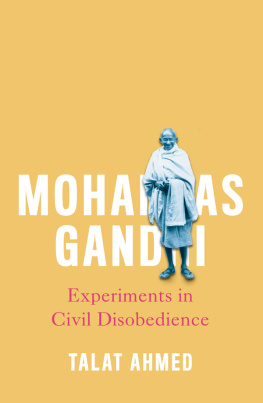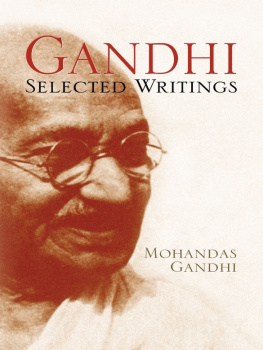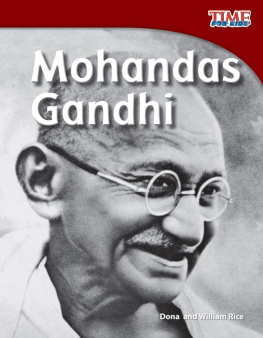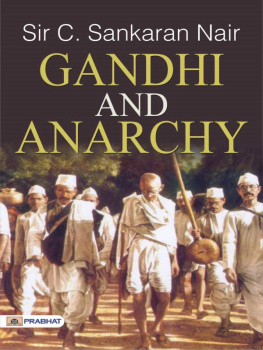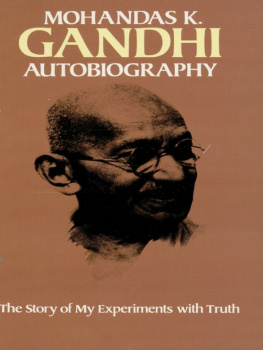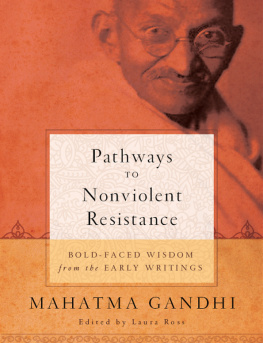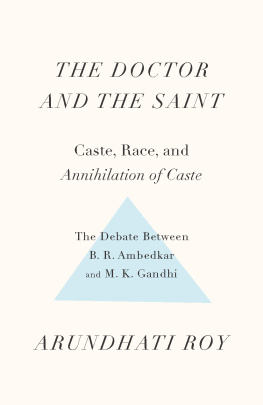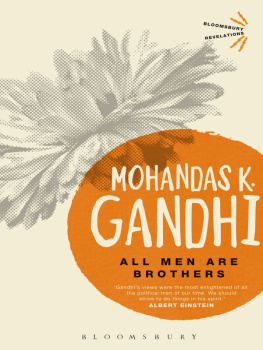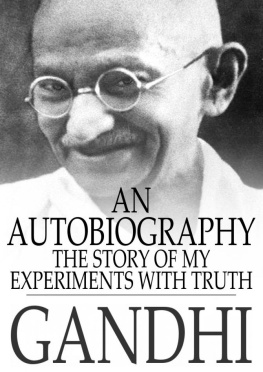Ahmed Talat - Mohandas Gandhi: Indias non-violent revolutionary?
Here you can read online Ahmed Talat - Mohandas Gandhi: Indias non-violent revolutionary? full text of the book (entire story) in english for free. Download pdf and epub, get meaning, cover and reviews about this ebook. City: India, year: 2016, publisher: Book Network Intl Limited trading as NBN International (NBNi);PlutoPress, genre: Politics. Description of the work, (preface) as well as reviews are available. Best literature library LitArk.com created for fans of good reading and offers a wide selection of genres:
Romance novel
Science fiction
Adventure
Detective
Science
History
Home and family
Prose
Art
Politics
Computer
Non-fiction
Religion
Business
Children
Humor
Choose a favorite category and find really read worthwhile books. Enjoy immersion in the world of imagination, feel the emotions of the characters or learn something new for yourself, make an fascinating discovery.
- Book:Mohandas Gandhi: Indias non-violent revolutionary?
- Author:
- Publisher:Book Network Intl Limited trading as NBN International (NBNi);PlutoPress
- Genre:
- Year:2016
- City:India
- Rating:3 / 5
- Favourites:Add to favourites
- Your mark:
- 60
- 1
- 2
- 3
- 4
- 5
Mohandas Gandhi: Indias non-violent revolutionary?: summary, description and annotation
We offer to read an annotation, description, summary or preface (depends on what the author of the book "Mohandas Gandhi: Indias non-violent revolutionary?" wrote himself). If you haven't found the necessary information about the book — write in the comments, we will try to find it.
Ahmed Talat: author's other books
Who wrote Mohandas Gandhi: Indias non-violent revolutionary?? Find out the surname, the name of the author of the book and a list of all author's works by series.
Mohandas Gandhi: Indias non-violent revolutionary? — read online for free the complete book (whole text) full work
Below is the text of the book, divided by pages. System saving the place of the last page read, allows you to conveniently read the book "Mohandas Gandhi: Indias non-violent revolutionary?" online for free, without having to search again every time where you left off. Put a bookmark, and you can go to the page where you finished reading at any time.
Font size:
Interval:
Bookmark:

Mohandas Gandhi
Revolutionary Lives
Series Editors: Sarah Irving, Kings College, London;
Professor Paul Le Blanc, La Roche College, Pittsburgh
Revolutionary Lives is a series of short, critical biographies of radical figures from throughout history. The books are sympathetic but not sycophantic, and the intention is to present a balanced and, where necessary, critical evaluation of the individuals place in their political field, putting their actions and achievements in context and exploring issues raised by their lives, such as the use or rejection of violence, nationalism, or gender in political activism. While individuals are the subject of the books, their personal lives are dealt with lightly except insofar as they mesh with political concerns. The focus is on the contribution these revolutionaries made to history, an examination of how far they achieved their aims in improving the lives of the oppressed and exploited, and how they can continue to be an inspiration for many today.
Also available:
Salvador Allende:
Revolutionary Democrat
Victor Figueroa Clark
Hugo Chvez:
Socialist for the Twenty-first Century
Mike Gonzalez
W.E.B. Du Bois:
Revolutionary Across the Color Line
Bill V. Mullen
Frantz Fanon
Philosopher of the Barricades
Peter Hudis
Leila Khaled:
Icon of Palestinian Liberation
Sarah Irving
Jean Paul Marat:
Tribune of the French Revolution
Clifford D. Conner
John Maclean:
Hero of Red Clydeside
Henry Bell
Sylvia Pankhurst:
Suffragette, Socialist and Scourge of Empire
Katherine Connelly
Paul Robeson:
A Revolutionary Life
Gerald Horne
Percy Bysshe Shelley:
Poet and Revolutionary
Jacqueline Mulhallen
Toussaint Louverture:
A Black Jacobin in the Age of Revolutions
Charles Forsdick and
Christian Hgsbjerg
Ellen Wilkinson:
From Red Suffragist to Government Minister
Paula Bartley
Gerrard Winstanley:
The Diggers Life and Legacy
John Gurney
Experiments in Civil Disobedience
Talat Ahmed

First published 2019 by Pluto Press
345 Archway Road, London N6 5AA
www.plutobooks.com
Copyright Talat Ahmed 2019
The right of Talat Ahmed to be identified as the author of this work has been asserted by her in accordance with the Copyright, Designs and Patents Act 1988.
British Library Cataloguing in Publication Data
A catalogue record for this book is available from the British Library
ISBN 978 0 7453 3429 5 Hardback
ISBN 978 0 7453 3428 8 Paperback
ISBN 978 1 7837 1514 5 PDF eBook
ISBN 978 1 7837 1516 9 Kindle eBook
ISBN 978 1 7837 1515 2 EPUB eBook
This book is printed on paper suitable for recycling and made from fully managed and sustained forest sources. Logging, pulping and manufacturing processes are expected to conform to the environmental standards of the country of origin.
Typeset by Stanford DTP Services, Northampton, England
Simultaneously printed in the United Kingdom and United States of America
Maps
Figures
There are a great number of people to thank for the help and support I received in the writing of this biography of Mohandas Gandhi. First and foremost, I would like to pay a particular tribute to all those who have contributed from a myriad of perspectives to the very rich scholarship on Gandhi and South Asia that has been generated over the last forty or fifty years. For a popular biography such as this, a specific debt is owed to the many historians who have painstakingly mined and explored Gandhis writings, probed a range of aspects of his life and investigated his impact on Indian nationalism and the varied meanings of his legacy for South Asia and beyond. Here special thanks are due to David Arnold, who as Professor of South Asian History at the School of Oriental and African Studies (SOAS) recommended that I teach on a course of his on Gandhi, while a research student. As a teacher, thanks are also owed to the many undergraduate students at SOAS, the University of Leeds, Goldsmiths College, and the University of Edinburgh, who subsequently took my own courses on Gandhi and participated avidly in seminars, contributing their own valuable ideas and questions. I am also grateful for the opportunity to present papers on Gandhi at the following institutions: the Mahatma Gandhi Centre for Global Nonviolence, James Madison University in 2009; the Centre for Social Change, University of Johannesburg in 2011, and the Department of History, University of the West Indies, St Augustine, Trinidad and Tobago in 2014.
This volume appears in 2019, and was written in part with the aim of making an intervention in the debates around the meaning and relevance of Gandhis life, work and legacy which will accompany the commemoration of the 150th anniversary of his birth. The year 2019 also marks the centenary of the Amritsar Massacre, an event that exposed the darker side of British rule in India and made a forceful case, if one were needed, for why it was imperative to oppose imperialism more generally. Thousands of Indians fought valiantly to free India from the yoke of the British Empire, and in this endeavour, they found common cause with anti-imperialists in Britain who became implacable foes of their own governments. This work is dedicated to the memory of two such individuals, Victor Kiernan (19132009) and Ralph Russell (19182008). As activists in the Communist Party of Great Britain, both worked to build solidarity with the Indian nationalist movement during the 1930s and 1940s and developed deep friendships with a generation of other young radical intellectuals in India, including those around the Progressive Writers Movement. Both learnt and became fluent in Urdu and their love for the language and literature resulted in translations of the great Urdu poets Mirza Ghalib, Muhammad Iqbal and Faiz Ahmad Faiz.
Victor, a one-time leading member of the Communist Party Historians Group, made an immense contribution to Marxist historiography in the post-war period, including his ground-breaking and superb work on The Lords of Human Kind: European Attitudes to Other Cultures in the Imperial Age, published in 1969, almost a decade before Edward Saids far more famous work, Orientalism. He taught Urdu and History at Aitchison College, Lahore and then was Professor of History at the University of Edinburgh until his retirement. Ralph taught in India and Pakistan and then was Professor of Urdu Literature and Language at SOAS until he retired. He remained an agitator and thorn in the side of university authorities over many decades, but also inspired students to great literary, linguistic and political heights. Whilst completing my PhD and beyond, I had the honour and pleasure of knowing both these remarkable men, who acted as very supportive but challenging intellectual mentors, with their deep knowledge and appreciation of South Asian history and their sharp analyses of Gandhi and nationalism. This little book comes out a decade after they both sadly passed, but it aims to pay tribute to both Victor and Ralph, and the wider tradition of radical, partisan scholarship that they both represented so well one which always stands with, and champions, the oppressed and exploited. In the spirit of their memory, it is only fitting that this book is also dedicated to all those in the twenty-first century who are not only experimenting with, but also utilising, effective civil disobedience in the struggle to change the world for the better.
Font size:
Interval:
Bookmark:
Similar books «Mohandas Gandhi: Indias non-violent revolutionary?»
Look at similar books to Mohandas Gandhi: Indias non-violent revolutionary?. We have selected literature similar in name and meaning in the hope of providing readers with more options to find new, interesting, not yet read works.
Discussion, reviews of the book Mohandas Gandhi: Indias non-violent revolutionary? and just readers' own opinions. Leave your comments, write what you think about the work, its meaning or the main characters. Specify what exactly you liked and what you didn't like, and why you think so.

